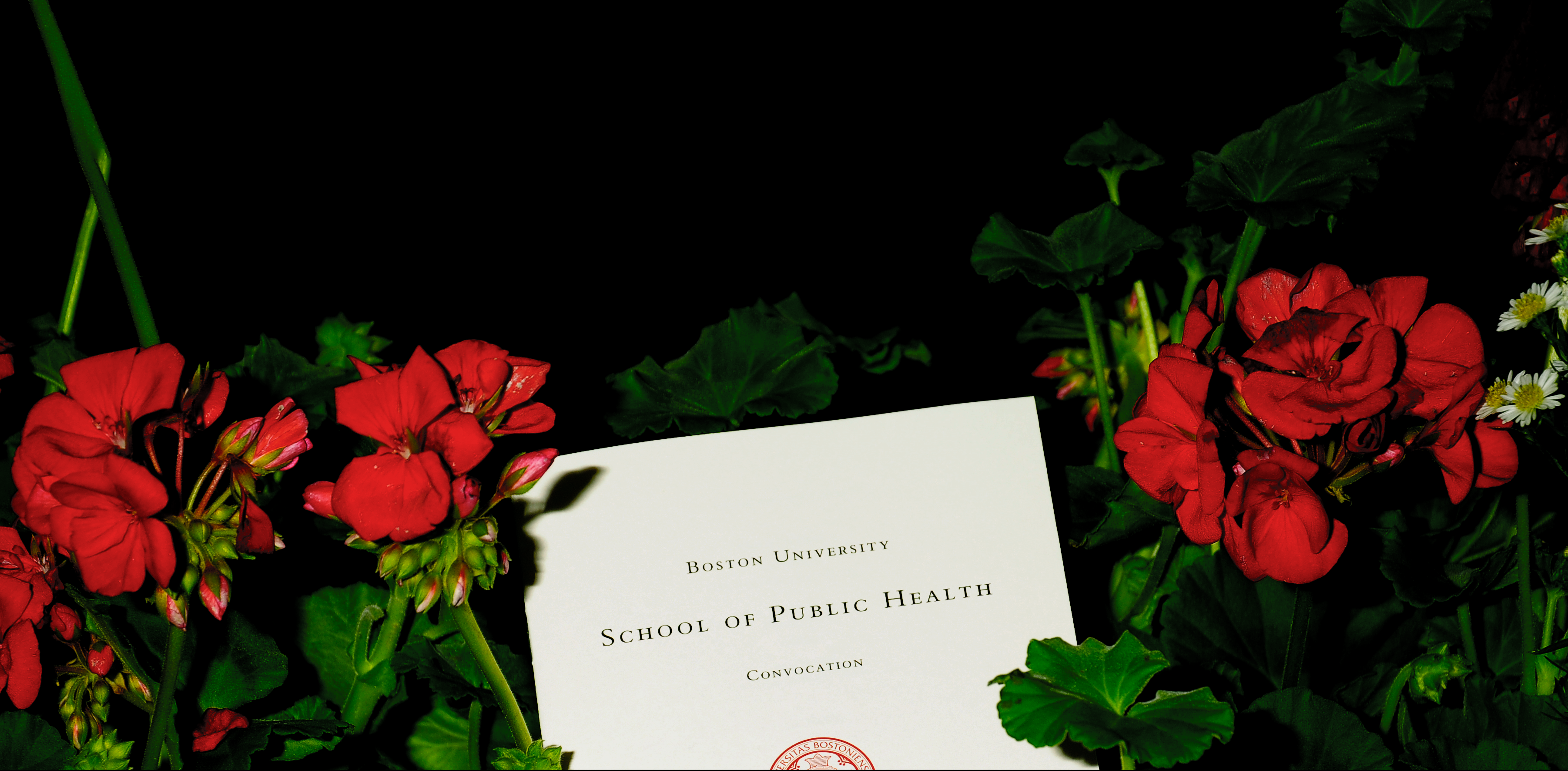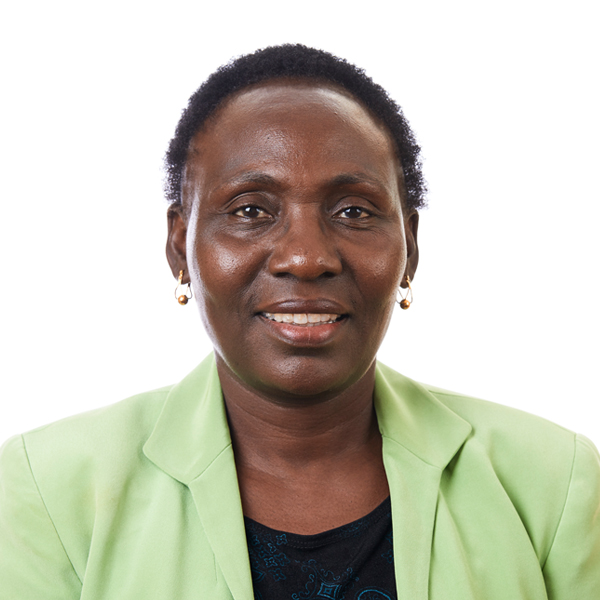Faculty, Staff, and Students to Be Honored at 2021 SPH Convocation.

Faculty, Staff, and Students to Be Honored at 2021 SPH Convocation
Hiba Abousleiman, Monica Onyango, Roberta White, Patricia Gonzalez, and Monica Wang will receive awards.
Congratulations to the members of the SPH community who will be honored with awards at the 2021 School of Public Health Convocation!
Hiba Abousleiman, an MPH recipient, is the winner of the Leonard H. Glantz Award for Academic Excellence.

The Glantz Award is the highest award granted to a graduating MPH student at SPH. The award is named in honor of Leonard H. Glantz, emeritus professor of health law, bioethics & human rights, who served for 30 years as academic dean and demanded rigorous standards in curriculum and teaching throughout the academic program.
Glantz Award winners are nominated by faculty, and should demonstrate exceptional academic performance, creative and critical thinking, and seriousness and professionalism in public health.
Abousleiman quickly distinguished herself as a “bold, critical thinker of the highest integrity” and a 4.0 student dedicated to justice, fairness, and equity within SPH and beyond. Passionate about promoting mental health and eliminating health disparities, she decided to pursue her MPH to develop programs and policies that address social issues such as income inequality, housing insecurity, and structural racism. While completing the community assessment, program design, implementation, and evaluation (CAPDIE) certificate, she impressed faculty members with her sharp and insightful questions and contributions to class discussions. Active at school and in the community, Abousleiman helped integrate a greater focus on health equity and anti-racism into the MPH program. She also served as a team manager for the Academic Public Health Volunteer Corps, managing a team of volunteers supporting the Provincetown Health Department’s COVID-19 response.
Abousleiman’s faculty nominators wrote that she is “a kind person who demonstrates the essence of professionalism, cultural awareness, sensitivity, and respect” and “one of those rare students who equally combines emotional and academic intelligence with passion and motivation.”
Monica Onyango, clinical associate professor of global health, is the winner of the 2021 Norman A. Scotch Award for Excellence in Teaching.

The Scotch Award is presented annually to an individual who has made outstanding and sustained contributions to the education program at SPH. The award recognizes individuals, faculty, or others who have substantially enriched the educational experience for the students at the school.
Onyango first joined SPH in 1998 as a student in the MPH program, studying global health. She began teaching at the school shortly after she completing the program, and has remained at SPH ever since.
A nurse midwife, Onyango’s research interests focus on reproductive health, maternal and child health, HIV/AIDS, healthcare among populations affected by disasters, and the role of nurses and midwives in improving health status of populations globally. Her expertise includes more than 25 years in healthcare delivery, including 10 years as a nursing officer with Kenya Ministry of Health and as a lecturer in the School of Nursing at Nairobi’s Medical Training College. From 1992 to 1998, Onyango worked as a health team leader with international non-governmental organizations in relief and development in South Sudan, Angola and a refugee camp in Kenya. In South Sudan and Angola, she facilitated the design and implementation of community based health services where there had been no services for several years. At Kakuma refugee camp in North Western Kenya, she helped design the maternal and child health programs for over 20,000 refugees. In 2011, she co-founded the global nursing caucus at SPH with a mission to advance the role of nursing in global health practice, education and policy through advocacy, collaboration, engagement and research.
In one nomination letter, a former student said that Onyango is the “perfect model for a teacher in a school of public health,” praising her as a “highly dedicated professional who knows how to motivate her students to strive for excellence.” The student also said that Onyango is a “dynamic and powerful communicator who possesses the gift of being able to make complex subjects understandable.”
Even more important than her instruction, another student wrote, is Onyango’s “sincere presence and interest in her students’ lives. She is very understandable, flexible, and approachable. Her students feel very comfortable in receiving guidance and help from her in any aspect of life or school.”
Roberta White, professor of epidemiology, is the winner of the 2021 SPH Faculty Career Award in Research and Scholarship.

This honor is given annually to recognize a faculty member for a distinguished body of scholarly or scientific work on a specific topic or within a general area of expertise.
A leading scholar in the field of neurotoxicology, White served as chair of the Department of Environmental Health from 2003-2017 and as associate dean for research from 2008-2015. As a neuropsychologist and a transdisciplinary scientist, her research focuses on the neuropsychological effects of environmental contaminants across the lifespan, from prenatal brain development to later life cognitive decline.
White’s early work on the developmental effects of lead and mercury exposure had a profound influence on the field, and resulted in new limit guidelines for children on these outcomes. She was also one of the earliest researchers to identify chemical exposures associated with Gulf War Illness, following the Gulf War of 1991. She uncovered cognitive and neuroimaging evidence of structural brain damage associated with GWI and sarin exposure in the GW veteran population. White coined the term ‘subclinical encephalopathy’ which refers to the chronic health effects from exposure to neurotoxicants without an acute poisoning event, and she also co-wrote the World Health Organization criteria for diagnosis of solvent encephalopathy, which are now used internationally.
In addition to her leadership roles at SPH, White also served as scientific director of the Congressionally mandated Research Advisory Committee on GWI from 2008-2015, and she also led the neuropsychology programs at the School of Medicine and VA Boston Medical Center.
In nomination letters, White’s colleagues lauded her role as a “key player” who broke barriers in a traditionally male-dominated field. One faculty nominator described her as “an exceptionally supportive and inspirational mentor” whose expertise “was a main driver for me when I accepted a faculty position at BUSPH. Bobbie is generous about sharing her wealth of knowledge and experiences about neuropsychological assessment and brain structure and function. Conversations about our scholarship on neurotoxicants are insightful and motivating, and her feedback on my work elevates it to a higher level.”
Patricia Gonzalez, director of administration in the Department of Community Health Sciences and interim director of administration in the Department of Global Health, is the winner of the 2021 Dzidra J. Knecht Staff Award for Distinguished Service.

The Knecht Award recognizes staff members who have made outstanding and sustained contributions to the administrative functioning of their departments and therefore the school. It is named in honor of Dzidra J. Knecht, the school’s first associate dean for administration, who spent 30 years working for the university, 20 of them at SPH.
Gonzalez became the director of administration in CHS at a critical time—shortly after the unexpected passing of the prior director, Karen Smith, and just prior to the school’s shift to remote work in March 2020.
As administrative director, she presides over the management and oversight of the department’s operations. Gonzalez has described her role as a “Jack of all trades, where no one day is the same.” Among her many responsibilities, she handles account reconciliation and trainings, and ensures that everyone in the department has everything they need.
Less than six months after she assumed her new role in CHS, Gonzalez became interim administrative director for the Department of Global Health. “Patty has stepped forward this year and taken on new roles and excelled at them by hard work and determination,” wrote one colleague in a nomination letter. “This speaks to Patty being a team player—not many others would do this.”
Prior to her current roles, Gonzalez serves as director of people services for more than two years, collaborating with units within the school and university. During her time in that position, she worked with the Staff Senate to develop a series of professional development workshops for staff members to help improve performance, aid in mentorship, and support career advancement.
Described as “trustworthy, productive, and dependable,” a colleague wrote that what they most appreciate about Gonzalez is that she is “open to suggestions. In meetings, Patty always comes prepared, is punctual, always follows up, and gets answers quickly… I have never written a nomination for this award in the past, but Patty has been so exceptional that I felt that I must.”
Monica Wang, associate professor of community health sciences, is the winner of the 2020 SPH Award for Excellence in Practice.

This honor is presented annually to a faculty or staff member who has made outstanding and sustained contributions to the health of populations through advocacy work, community engagement, and/or public policy endeavors.
Wang is a leading health equity researcher in obesity and chronic disease prevention who directs community-engaged research to target racial inequities in health, and pursues cross-sector collaborations to promote health and health equity through public health interventions and policies.
Wang’s “dedication to advocacy work, community engagement, and public policy is evident through the many public policy position statements she developed in 2020 regarding COVID-19 and health equity that were reviewed and approved on behalf of the Society of Behavioral Medicine (SBM),” wrote one colleague in a nomination letter.
Among the SBM statements that she led or co-led are positions that address equitable healthcare during the pandemic, COVID-19 and rural health inequities, and comprehensive police reform and invest in systemic racism research.
In 2020, Wang also presented eight grand rounds and virtual town hall discussions on the topic of race, racism, and health care; racial health inequities, and social determinants of health to US healthcare systems and hospitals.
Wang also serves as associate director of narrative at the BU Center for Antiracist Research, working to shift the narrative around racism and racial injustice by overseeing collaborations, programs, and events that translate evidence-based recommendations to achieve racial equity. She is a founding editorial member of The Emancipator, a new partnership between the Center and Boston Globe Opinion that seeks to reframe the national conversation on race and promote racial justice through research, education, and expert insight through a multimedia platform.
“Monica’s commitment to building a more equitable society through her consistent engagement in public health practice is nothing short of exceptional,” a nominator wrote. “Her production of six public engagement pieces in 2020 alone and invitation to give eight national and regional invited trainings on antiracism at prestigious healthcare systems (during the peak pandemic months) is a true testament to her unwavering commitment to health equity and racial justice.”
Several other faculty, staff, and students will be recognized for their accomplishments during a virtual SPH Awards Ceremony from 3-4:30 pm on Friday, May 14. The 2021 SPH Convocation will take place from 12-1:30 pm on Saturday, May 15.